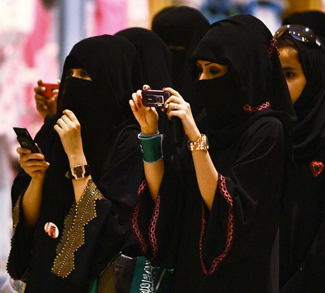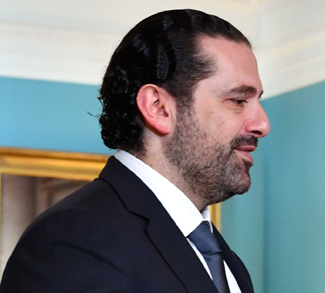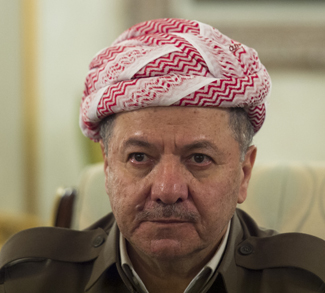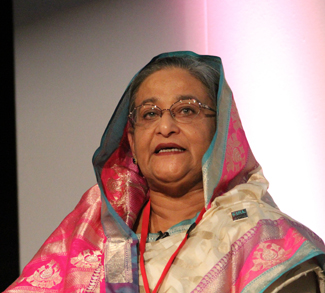December has been an eventful month for women’s issues in the strictly traditional Gulf emirates. On December 12-13, Abu Dhabi hosted a two-day summit entitled “United for Shaping the Future” which brought together 50 women speakers of parliament from around the world to discuss geopolitical, economic, and gender issues. The speakers included Dr. Amal al-Qubaisi, the president of the Emirati Federal National Council and a trailblazer for female participation in Arab political life, and they focused particularly on the crucial role women can play in brokering peace in the fractured Middle East.
That summit came on the heels of British Prime Minister Theresa May’s historic participation in this year’s GCC summit in Bahrain. Of course, May’s visit was not meant to serve as a statement on women’s rights. The Prime Minister was in town to cement security and trade ties with key Gulf allies, and one of the main items on her agenda was pushing ahead with security cooperation and a free trade deal between the post-Brexit UK and major Gulf economies like Saudi Arabia and the Emirates.
The Saudis, for example, have been pursuing British technical assistance for their economic reforms. May, for her part, spoke directly to those requests in her remarks and made it clear that Britain would offer its expertise and support, taking advantage of the opportunities Riyadh and its neighbors are offering London for closer economic ties in the process.
In Syria, where the underpinnings of daily life have largely been torn to shreds, efforts like these might be the only hope for the country to put itself back together. Amid the violence, there are already encouraging signs.
Even if she was primarily there on business, May’s very presence as a female prime minister was consequential in and of itself. It was the first time a woman took direct part in a GCC summit, and her visit had the added bonus of bringing one of the most powerful female politicians in the world to speak on an equal basis with the Gulf emirs. At a time when women in the Gulf states are pushing steadily against the strict limits keeping them from full participation in civic and economic life, Theresa May and female German defense minister Ursula von der Leyen (who visited Riyadh days later) served as flesh-and-blood reminders that the Peninsula’s gender barriers belong in the past.
Slowly, regional establishments are learning this lesson. Saudi Arabia’s diversification plan, for one, revolves around raising the number of women in the workforce, and a steady trickle of public statements by political and religious leaders have paved the way for incremental reforms. It’s good to see the most conservative countries in the Middle East realize they need to bring women into politics and the economy, but their actions are thus far limited to baby steps.
Then again, the Gulf emirs have thus far been able to afford their glacial pace. Their lavish oil wealth has always funded a system where neither male nor female citizens needed to worry too much about earning a living. Elsewhere in the region, though, the patriarchal Arab societies of years past have been completely shattered by conflict.
Where Saudi Arabia is making changes to its economic model due to shrinking oil revenues, Syria (to take the most extreme case) faces the daunting prospect of piecing back together a country where major cities have been reduced to rubble and 11% of the population has been either killed or injured by the war. However and whenever the fratricidal Syrian civil war ends, this much is clear: like other countries that have faced similar catastrophes in the past, it will be women in Syria (or those now living as refugees outside of it) that carry the burden of piecing their societies back together.
The best example for how Syria could someday lead the recovery effort might be found in Rwanda, which survived the horrific slaughter of up to a million people in 1994 to emerge as one of the strongest economies in Africa. Following the upheaval of the genocide, in which a disproportionate number of men were killed and many male perpetrators fled to neighboring countries, 70% of Rwanda’s post-genocide population was female. The traditionally patriarchal society thus forced women into the role of rebuilders.
They stepped up, taking in orphaned children, forming support groups for widows, reconstructing buildings, running farms, and starting businesses. They gained political clout by organizing local councils, overseeing judicial proceedings, and creating stability in the aftermath of chaos. Rwanda now boasts one of the highest levels of women’s participation in government worldwide, with women accounting for 64% of parliament. The country’s rankings for economic development and gender equality are also among the best on the continent.
In Syria, where the underpinnings of daily life have largely been torn to shreds, efforts like these might be the only hope for the country to put itself back together. Amid the violence, there are already encouraging signs. The women who remain in Syria are already helping to keep schools, hospitals, and other community institutions functioning. In the sprawling refugee camps hosted by Turkey, Jordan, and Lebanon, women have created support systems to help new arrivals and to build new communities – communities that will eventually form the foundation of the country they are to rebuild.
The struggles of these female refugees underlines the vital need not just for more summits and high-level visits, but also for support for Syrian female empowerment from the ground up. Investing in these women’s education has never been more important. If Syrian women, like their Rwandan counterparts, can successfully rebuild their war-torn country, they can also rewrite the rules governing the place of Arab women in the world (including in the Gulf). As al-Qabaisi emphasized that fact at the women’s summit in Abu Dhabi: “Women are the heart of any society, the biggest investors in peace and security, and the greatest defenders of the interests of future generations.”




